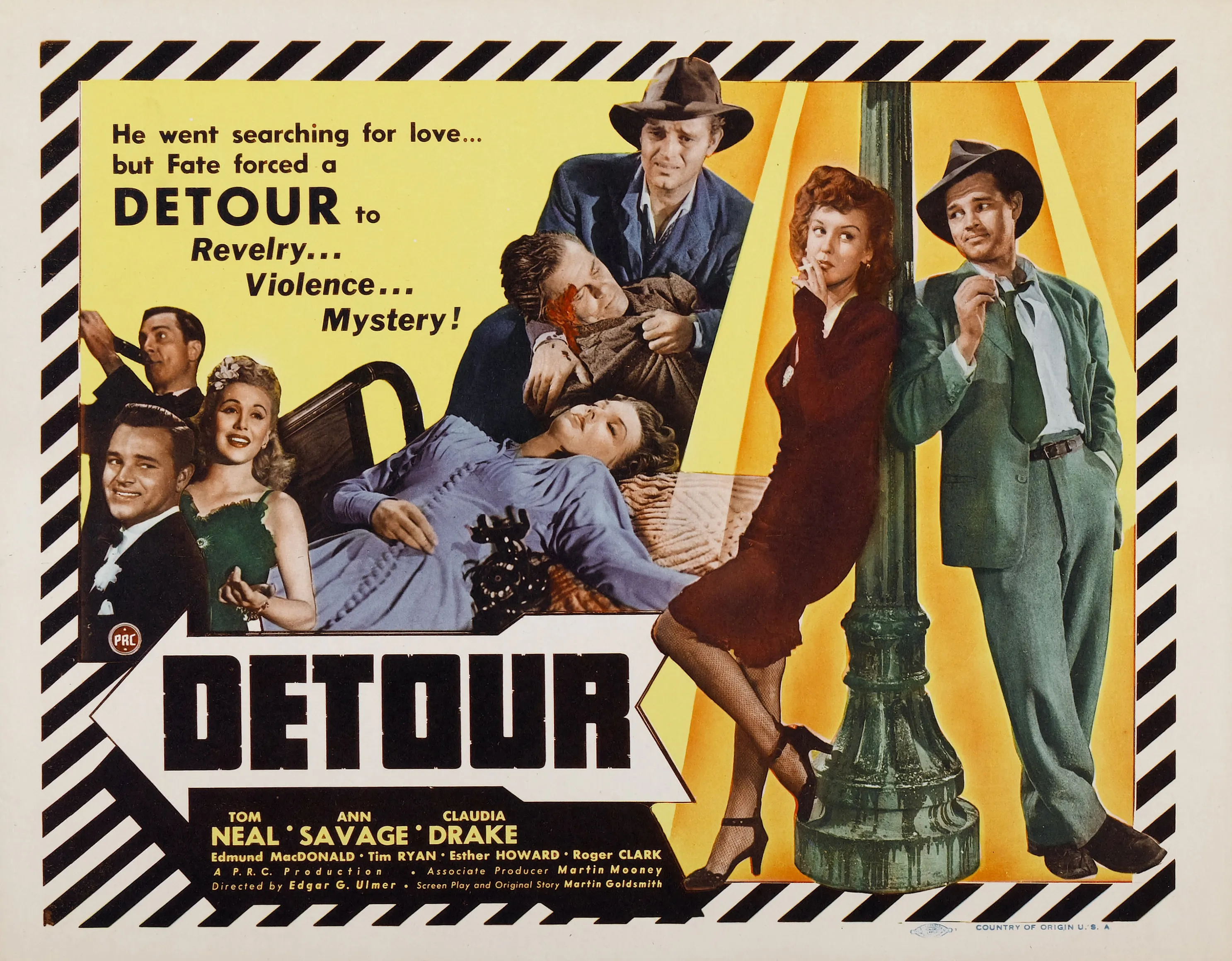Even before they take a consequential detour, the characters in Edgar G. Ulmer’s 1945 film have difficulty making their dreams come true. Al Roberts aspires to play piano at Carnegie Hall, but he has been stuck serenading seedy patrons of the Break o’ Dawn Club for years. His girlfriend, Sue, wants to be a Hollywood star. After arriving in Los Angeles, however, she can only secure a job as a fry cook. To revitalize his ambitions, Al sets off from New York to join Sue in Tinseltown. Charles Haskell Jr., a shady bookie, offers to drive him part of the way, but en route, Haskell mysteriously dies. Afraid he will arrested for murder, Al becomes a fugitive, and Sue sinks into depression once she realizes that Al will never arrive. This bleak film is hard to take, yet it provides illuminating commentary on the constraints of dreams and the fickleness of fate.
While “Detour” may leave an indelible impression on modern audiences, it was not produced with posterity in mind. Director Edgar G. Ulmer was an émigré who spent most of his career churning out banal B-pictures at small studios. “Detour” was made in fourteen days on a shoestring budget, and the finished film seems unpolished. It is riddled with enough continuity errors to make a film theorist faint. Ulmer often uses the same backdrops and stock footage over and over again, but he does not try to conceal these shortcuts. Instead, by exposing them, he enriches the surreal nature of the story. Dreams can warp reality just as much as clumsy cuts, and they too are replete with insignificant images that repeat.
Of course, the areas through which Al travels are already haunted with dreams. The barren deserts of the Southwest sparked the imaginations of his ancestors. In 1845, a century before the film was released, the journalist John L. O’Sullivan argued that the United States had a right to annex Texas and another lands from Mexico. He envisioned that America would eventually “overspread and… possess the whole of the continent.” O’Sullivan did not believe that this idea was fantastic but declared that it was inextricably linked to fate. It was America’s “Manifest Destiny” to conquer the continent. Indeed, O’Sullivan’s dream quickly moved from the ethereal to the real. By the end of the 19th-century, the United States spanned from sea to shining sea.
It could be destiny or just a coincidence, but it seems appropriate that Hollywood was established in the West. Al’s destination was often referred to as “the dream factory” in the 1930s and 1940s. As the scholar Benjamin Schwarz writes in The Atlantic, Hollywood movies did not just provide entertainment for their audience. Instead, “they taught generations of Americans… how to light a cigarette, wear a suit, kiss, decline or accept a pass, [and] how a gentleman ought to behave.” Not only did the movies purvey an ideal vision of life, but they were also fraught with portents of destiny. They promised viewers that they could be as successful as the stars, if only they followed their scripts.
The protagonists in “Detour” are doomed not because they reject those scripts, but because they adhere to them too closely. Just as Americans were “destined” to create a colossal country, Al and Sue naively believe that they are destined for love and happiness. They think that they are in a deluxe Hollywood production when they are in a dismal B-film. The only person in the film who seems to recognize this sad truth is the venal Vera. Al picks her up while he is on the lam, and she immediately suspects he killed Haskell. Many movies of this era feature a femme fatale, a dangerous, brazen woman who leads the hero astray. Vera does deepen Al’s misery. She prevents him from calling Sue to tell her what has happened, and she blackmails him into doing her bidding. Yet, in other respects, she’s less of a femme fatale and more of a feisty fatalist. As she brashly tells him, “people knock themselves out trying to buck fate… we’re all gonna kick off someday. It’s only a question of when.” Vera’s statement is nihilistic and contradicts all mythology. Pioneers and moviemakers espoused an attractive ideal—that every person was entitled to a glorious destiny and could achieve his dreams. Yet, even as they follow in the footsteps of frontiersmen and film stars, no one in “Detour” can transcend their limits.
It is strange that this scroungy, sobering film remains compelling today, but then again, the discourse on dreams and destiny has not died. Songwriters Justin Paul and Benj Pasek supplied lyrics for the 2016 film “La La Land.” An aspiring actress sings their first musical number, “Another Day of Sun.” She recalls how she left a paramour “at a Greyhound station west of Santa Fe.” Like Al, she traveled through the western landscape. Just as Al and Sue hoped to find happiness in Hollywood, the singer explains that she took such drastic action because the movies “called [her] to be on that screen and live inside its sheen.” Since she was “called,” she is fated for stardom. Still, while Pasek and Paul celebrate the chutzpah of youth, Ulmer reminds us that we are just one detour away from despair.
Contact Amir Abou-Jaoude at amir2 ‘at’ stanford.edu.
